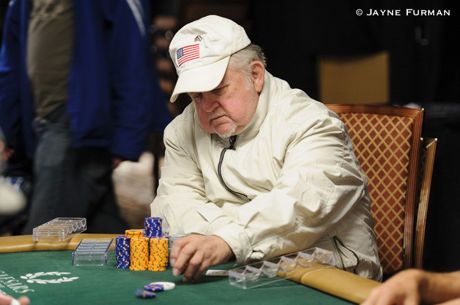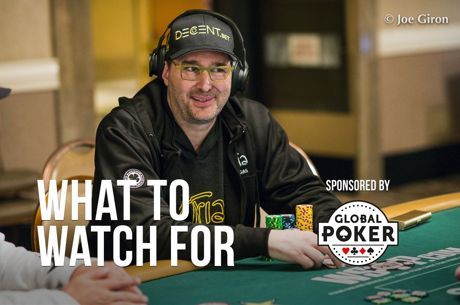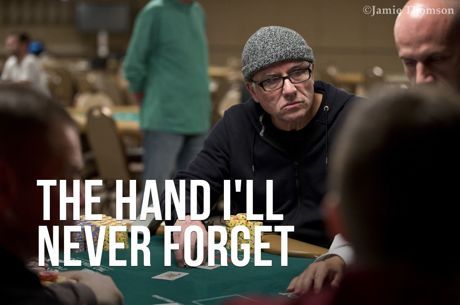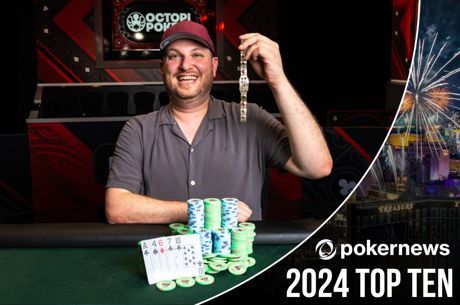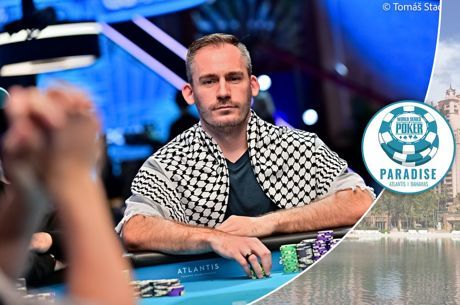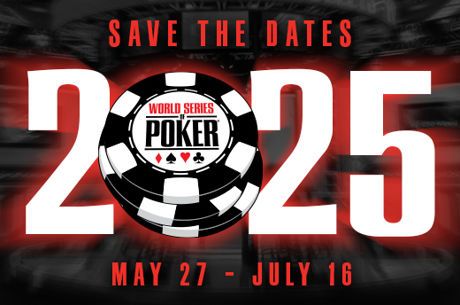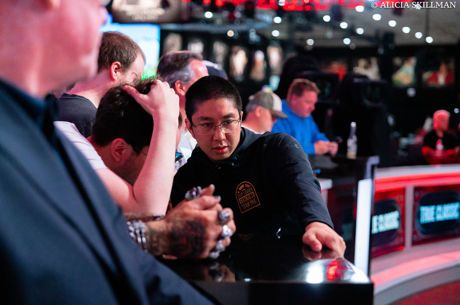Chasing Scoops: Johnny Quads on Poker, Dealing, & the National Enquirer
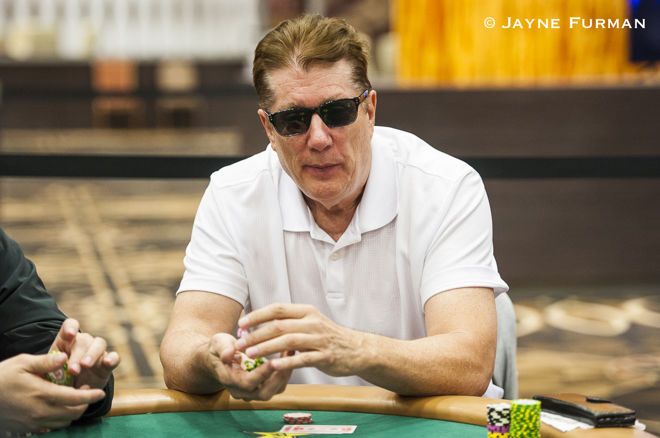
For John Wenzel, getting a scoop is something he’s accustomed to – both at the poker tables and as a former editor for The National Enquirer. This unique job is just one of the many in a career that has taken him from cash game player to editor of Poker Pro Magazine to poker room shift supervisor and then even to WSOP dealer.
This year, “Johnny Quads” is on the other side of the felt after using his experience as a dealer to retool his game and is hoping for some scoops – not the latest celebrity gossip, but the kind with plenty of multi-colored chips. As he battled it out Sunday in the second flight of the Monster Stack, PokerNews spoke with him about his unique life in and out of the poker world.
Life in Poker
While growing up in Milwaukee and New York, there were always cards around in the Wenzel home. His parents were champion bridge players, but watching James Garner on “Maverick” as a kid introduced Wenzel to poker.
“I thought he was so cool,” Wenzel says. “I don't recall who actually showed me poker, probably my grandmother, but I couldn't have been older than six. I remember my mother always saying, ‘That kid was born with a deck of cards in his hand,’ and that I had good card sense.”
“I won in the first game I ever played and basically have been playing with other people's money since.”
In games with grade-school classmates, penny-ante Five-Card Draw was the game of choice with a maximum bet of a nickel. With an allowance of a nickel a week, that was a hefty game.
As he played more, Wenzel found he had an instinctive understanding of the game. Even at a young age, probabilities and odds were fascinating and he pored over the few published books on poker he could find.
“The games I played with street kids in junior high are, to this day, as tough as any games I've played anywhere, and the lessons I learned about poker and life are still with me,” he says. “Not just about bluffing, misdirection, pretense, and manipulation, but also about cheating. These kids would cheat you blind if you let them.”
Those games taught Wenzel to read people and know what kind of person he was dealing with – what he considers the No. 1 skill in poker and life.
“I had a real talent that helped me not only around the felt, but later as a reporter,” he says. “I'd be interviewing some politician and I'd know at once when he was lying.”
One story sticks out. His father was hosting a poker game, but there was some complaining about not having enough players.
“I can play,” Wenzel piped up.
His father initially said no.
“I've heard about these kids playing in the afternoons,” one of the men said. “We need him. Let the kid play.”
Wenzel dug out every penny he’d ever won from the shoebox he kept his winnings in and had just enough for a buy-in.
“These weren't suburban dads on a lark,” Wenzel says. “These were tough, working-class fathers making $80 a week at tough jobs and trying to support families. Losing $20 would leave a mark. And the fact you could win $50 or more in this game was huge.”
The game was also a chance to have a few beers, smoke, and talk – not sugar-coating their language just because a kid was in the game – with no intention of going easy on the 12-year-old. With his adrenaline pumping, he was dealt in on the action until the game changed to Stud Hi-Lo.
"What's a low?" he asked.
More lowball variations followed, but Wenzel began to understand. He quickly had more money in front of him than he’d ever seen – and decided to make an exit.
"Well, I think it’s past my bedtime,” the young card shark said. “I better cash out."
The room grew quiet and one man puffing a cigar asked: "How much you up?"
After Wenzel’s reply, he said: “I think you can stay a little longer.”
“If you were to ask me when I became a man, it was in that moment,” Wenzel says. “They weren't treating me like a kid. I escaped with a small win, and my reputation around the neighborhood was made.“
At the tables, Wenzel found his home and has been a winning player since.
“I won in the first game I ever played and basically have been playing with other people's money since,” he says. “I used to keep my winnings in a shoebox in my room. Today my winnings are in a separate fund and I don't touch it for anything but poker. I've never had a losing year and the fund today is quite substantial and I don't really have to work again if I don't want to.”
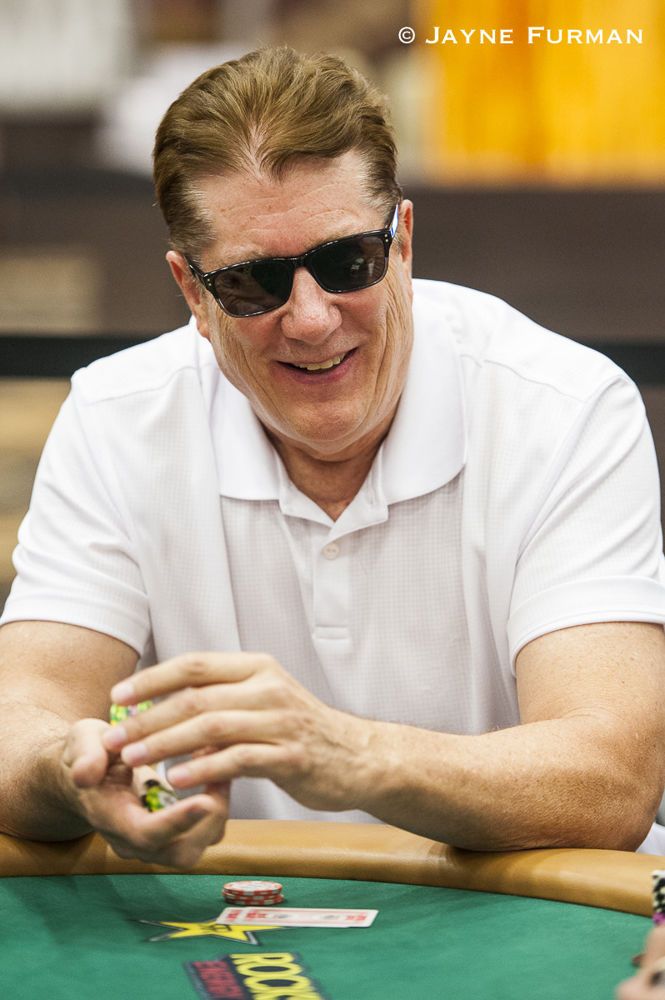
The Double Life of Johnny Quads
As he continued to play, Wenzel began traveling to Vegas for action. Local games were all limit stud and draw. Hold'em wasn’t yet popular outside Vegas and in the early-’90s, Wenzel earned his nickname after a big game at the Mirage.
“I was dealt quads four times and got paid off big each time during a crazy, drunken game with a bunch of Texans,” he says. “When I regained consciousness the next day, my Florida buddies were calling me Johnny Quads and I had more money than I had ever won before. They took the nickname back to Florida with us. I thought it was goofy at first, but I've come to like it.”
“As I said in one of my books: Don't turn a game you love into a job you'll hate."
Those winnings were used to play in private games in the Southeast, with many in private homes as Florida didn’t legalize big buy-in poker at cardrooms until 2009. Wenzel says some of the state’s biggest games are in Palm Beach mansions or hotels, and It took years to get invited.
“Eventually, I found big games in other Florida cities, and if one of those wasn't available a particular weekend, I’d fly to Vegas, Atlantic City, or Biloxi after work Friday night and return on the red-eye in time for work Monday morning,” he says. “It was a double life, and some years I made more at poker than at my straight job, but the smartest decision I ever made was to keep my day job. By doing that, poker has remained fun, not work.
“As I said in one of my books: Don't turn a game you love into a job you'll hate. I firmly believe that poker is meant to be a game, not a way of life. I still get excited every time I sit down to play, because it's not a job and I don't need to put in hours if I don't feel like it.”
Chasing Scoops with The National Enquirer
After graduating from the University of Wisconsin with a degree in journalism and mass communications, when not playing poker Wenzel worked for newspapers and magazines in Wisconsin, Pennsylvania, and Florida.
“Eventually I saw the handwriting on the wall,” he says. “Newspapers were being taken over by bean-counters, and a lot of the interesting characters that used to be in journalism were disappearing.”.
He jumped at the opportunity to work at The National Enquirer, which at the time sold about 5 million copies a week, more than the Wall Street Journal and The New York Times.
“Every day was fun, dealing with celebrity news and doing wacky stories,” he says. “This was back in the days when the Enquirer was everyone's guilty pleasure and if something appeared in the Enquirer, people took notice. It's become a joke these days, but back then, if something was in the Enquirer, you had to deal with it. We made everything sensational and titillating, yes, but you can be pretty sure that if something was in there about a celebrity, there was some truth to it.”
At times, celebrities treated the paper like a game. He recalls Michael J. Fox was getting married and weddings are big in the tabloids – readers can relate and they’re more evidence that "celebrities are just like us," he says. Rather than giving photographers a few easy wedding pictures, Fox was secretive and hired a security firm just to keep tabloids from getting a photo.
By spreading some money around, the Enquirer found out the wedding was going to be in a remote location outdoors in Vermont. The only photo opportunity was from a nearby pasture. Editors hatched a plan to have photographers wear cow costumes and get as close as possible for a shot with a long lens.
“The problem was there were no cow suits available anywhere,” he says. “However, there were llama suits. Needless to say, strange looking llamas attracted attention. Busted!”
Wenzel left The Enquirer in 2005 after the company moved operations from Florida to New York. He spent a year playing, dealing, and writing books.
As poker’s popularity exploded in the mid-2000s, he became editor-in-chief of Poker Pro Magazine from 2006 to 2012 with editions in the U.S., Canada, the U.K., and Scandinavia. The magazine gave many writers some of their first published stories in a poker magazine including Chad Holloway and the writer of this article.
“I still remember my first published article, which was in Poker Pro,” Holloway says. “Despite not having much experience at the time, Johnny Quads gave me a chance on a fantasy poker piece. Back then fantasy poker was in its infancy and not a lot of publishers were covering the topic. It turned into a regular gig and really helped build my poker resumé. He played a key role in my poker career and I’ll always be thankful for that.”
When Black Friday killed the company’s cash flow, Poker Pro went the way of many other magazines and ceased publication.
“Poker Pro was a perfect fit for me,” Wenzel says. “It was sad when it ended. People still recognize me from the magazine and tell me how much they miss it.”
Dealing Days
After plenty of poker and editorial stints at the Enquirer and Poker Pro, Wenzel moved to Council Bluffs, Iowa, for a career change. He worked as a poker room shift manager at the Horseshoe. A year later, he moved back to Milwaukee to work at the Potawatomi Casino to run the property’s tournaments.
After a couple years in the poker industry, however, Wenzel decided he needed to get back what really made him happy.
“One day I looked in the mirror and said, ‘Writing is what you were born to do. Isn't it about time you did it for real?,” he says. “So I bought a little house in west Iowa near Omaha and have been writing ever since.”
With two first drafts of two novels complete, he’s putting the finishing touches on them now and hoping to land a publisher. He also still deals occasionally at the Horseshoe to get away from the computer screen. When not playing poker or writing, Wenzel enjoys, traveling, working out, playing tennis, and “searching for the woman of my dreams.”
In 2016 and 2017, he added another bullet point to his career – dealing at the WSOP. A position often taken for granted, Wenzel experienced the grind first-hand. While players can appreciate the long days, dealers must occasionally deal with some not so nice players on top of that.
“It was grueling,” he says. “We worked our tails off six or seven days a week, 10 to 14 hours a day. It was tough, both mentally and physically – much tougher than playing. Many don't last, but if you make it through, there is a tremendous feeling of accomplishment and camaraderie, as if you've been to war together.”
"I’ve identified some flaws and problems with the way many players approach tournaments these days."
While Wenzel says the money was good, his main motivation was to study the best players in the world from an objective viewpoint rather than the subjective viewpoint of a player at the table.
“Without a vested interest in the game, you see the game clearer, and you are exposed to more players,” he says. “If you pay close attention, dealing can greatly improve all aspects of your game, especially identifying player types, reading players and putting them on hands, as well as bet-size implications, contemporary strategies, bluffing situations, and identifying how different nationalities play. It's all knowledge for your poker memory bank.”
As a regular cash game player, the 30,000 hands he dealt the past two summers helped retool his game to tournament play.
“If I was a pro, I would play cash, as I always did in the past, and there were times when I really needed the money I earned at the tables,” he says. “But since I am now playing for the joy of the competition, I’m going to go for the big score. I’ve identified some flaws and problems with the way many players approach tournaments these days. I’ll use this knowledge in bracelet events this month. Wish me luck because in tournaments, no matter how skilled you are, you definitely need it.”
SIDE ACTION – The Inside Deal
After weeks of action, thousands and thousands of hands, and plenty of interesting people, dealers see some pretty interesting scenarios. What is one that stands out for John Wenzel?
“One of the most bizarre things I observed while dealing the WSOP, besides being cussed out in Russian, was players who said they were backed or staked. And I would watch these guys play and they would just be terrible.I'd think to myself, ‘Who are the nutballs who are backing these guys? What are they thinking?’ I even saw one dude in the Main Event, rip-roaring drunk, and playing on someone else's dime.”
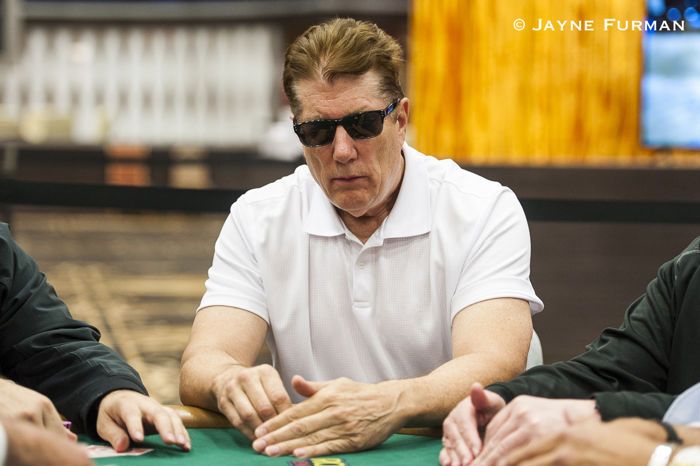
Sean Chaffin is a freelance writer in Crandall, Texas. His work appears in numerous websites and publications. Follow him on Twitter @PokerTraditions. He is also the host of the True Gambling Stories podcast, available on iTunes, Google Play, TuneIn Radio, Spotify, Stitcher, PokerNews.com, HoldemRadio.com, and TrueGamblingStories.com.

